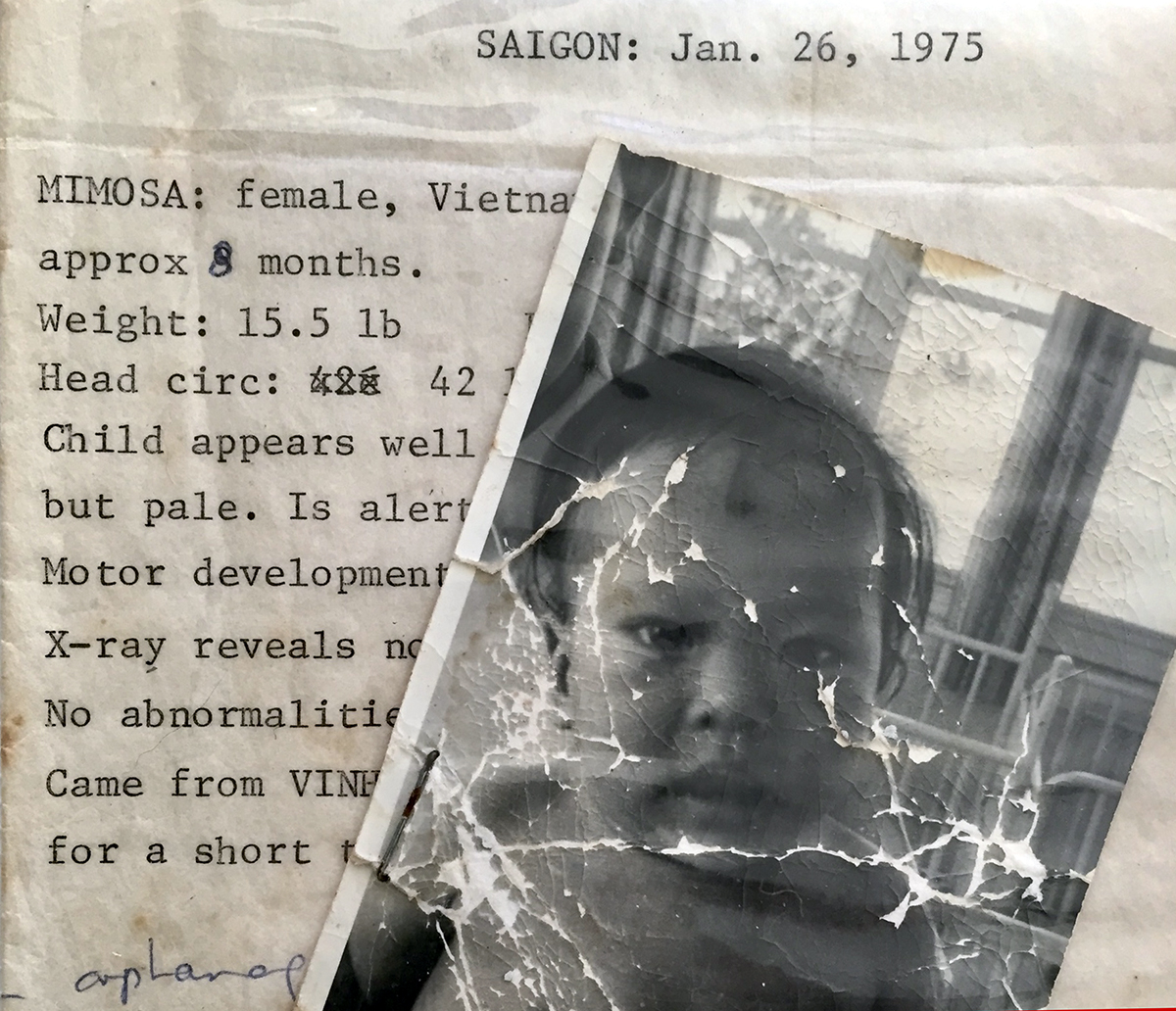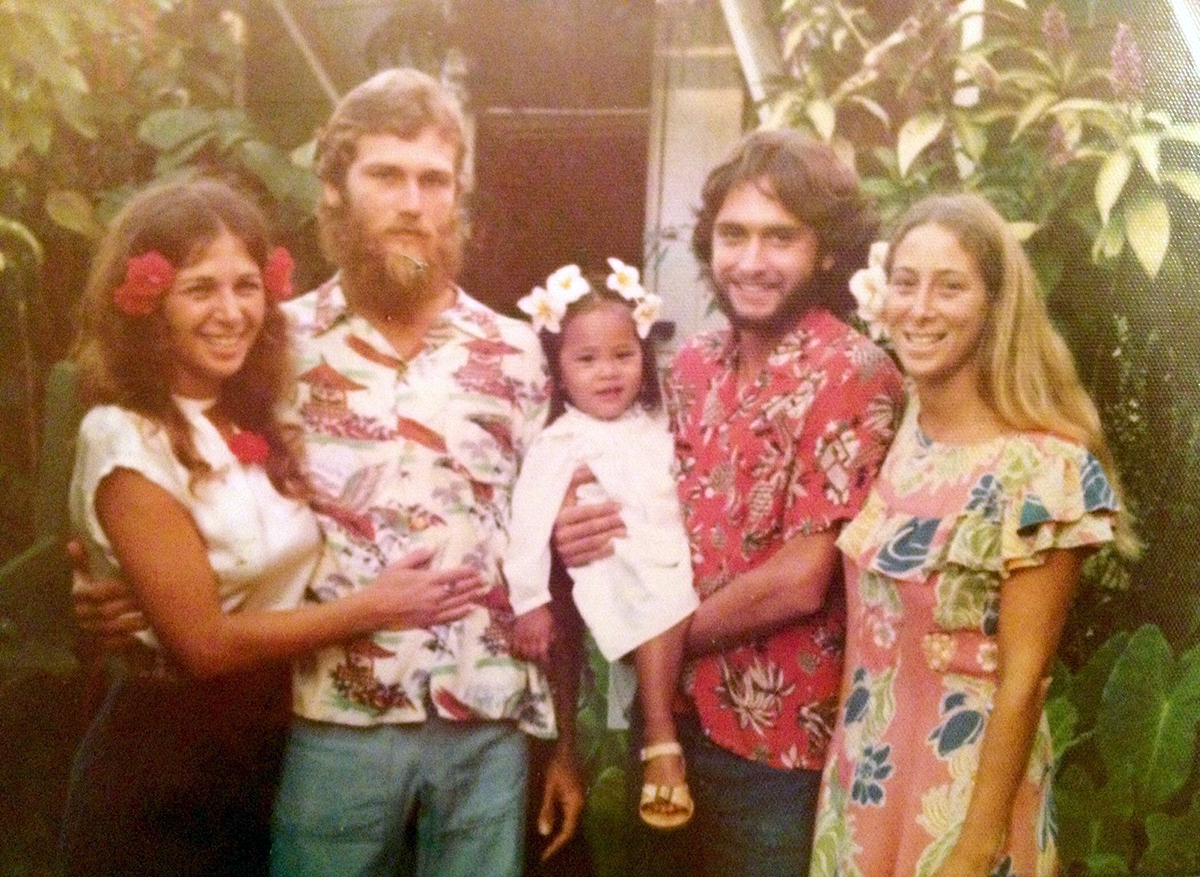UIT’s Liechty lends creative talents to ‘Operation Babylift’ archive and exhibit
While driving to Nevada’s Valley of Fire State Park in 2013, Stella Liechty decided she was “going to keep” her traveling companion, Devaki Murch. The two were carpooling to a camping retreat for faculty and students in the Multi-Disciplinary Design program in the University of Utah’s College of Architecture + Planning, where Liechty was an undergraduate and Devaki was a teaching assistant earning her master’s degree.

Stella Liechty, senior organizational change manager/process analyst, UIT Strategic Planning and Process team
“We had so much to talk about over those seven hours,” said Liechty, a senior organizational change manager/process analyst for UIT’s Strategic Planning and Process team.
Years later, Liechty learned about a defining moment in Murch’s life — Operation Babylift — an initiative by President Gerald Ford to airlift and adopt Vietnamese orphans during the waning months of the war. Murch appears in a special edition of “20/20” about Operation Babylift that aired on May 8, 2025, on ABC. April marked the 50th anniversary of Operation Babylift, which evacuated more than 3,000 orphans from Vietnam.
Instead of a birth certificate or baby book, Murch has clippings from the front page of the New York Times and her name on a survivor manifest. On April 4, 1975, a few weeks before the end of the Vietnam War, the first plane to leave as part of Operation Babylift dropped off howitzers and picked up children from Saigon (Ho Chi Minh City). Murch was 9 months old and among the children loaded two or more to a seat in the troop compartment; the rest would begin their journey to America via the Philippines secured to the floor of the cargo compartment.
Murch’s adoptive history inspired the Operation Babylift Collection, a richly researched online archive Liechty helped Murch launch in 2024 about adoptees, families, volunteers, and military personnel involved in the mission.

Identity papers sent to Devaki Murch’s adopted mother, Sunday, about her new daughter, “Mimosa.” (Photo courtesy of Murch)
“We’ve spoken with women who volunteered at 19 or 20 years old to work in an orphanage midwar in Vietnam, who said, ‘Well, I just got my nursing degree, I have to go,’” Liechty said. “Last year, we met a woman named Julie who hadn’t engaged in anything related to the war since then, who reunited with a physical therapist, a flight attendant, and a nun. It’s really powerful to see these cool and courageous women reunite and start crying all these years later, women in their 80s finally able to heal part of themselves.”
Liechty was also touched by the stories of U.S. military veterans who “wrote home, asking for diapers for the babies and chocolate for the nuns.” Vets they’ve spoken with have donated insignias, medals, pins, and patches that Liechty and Murch have incorporated into a series of traveling exhibits based around different themes in the Operation Babylift Collection.

Devaki Murch
“People have come out of the woodwork to see the exhibits,” Murch said. “For some adoptees, it’s the first time they’ve seen many of the archives. Some families had never known the connections with the caregivers or the volunteers’ roles in transporting the children from Vietnam to their destinations.”
Added Liechty, “We’ve found so many people touched by the experience of helping orphans find safety and homes at such a traumatic time,” Liechty said. “It gives me goosebumps every time I think about people learning more about themselves. … It’s powerful when adoptees find their names in a flight manifest — ‘There I am.’ or ‘Oh, I didn’t know my birthday was this day,’ or ‘I’m three months older than I thought, and my star sign is all wrong.’”
Most of the adoptees’ records were lost.
Friends for All Children, an adoption assistance agency based in Boulder, Colorado, which facilitated adoptions for Operation Babylift held the remaining records: birth certificates, intake records, correspondence with adoptive parents, placement assessments, legal papers, notes, and pictures of the children. After shuttering in 1977, some records were distributed to Boulder County Social Services while others remained in the custody of Sister Mary Nelle Gage, who arrived in Vietnam in 1973 following a call to action from her fellow sisters.
More to explore
Discover more media and archival material related to Operation Babylift, courtesy of the Operation Babylift Collection:
While digging through 33 banker boxes in the basement of Gage’s home in Lakewood, Colorado, last year, Murch found handwritten letters from her adoptive mother, and paperwork documenting her health, status, updates after placement, and Immigration and Naturalization Service documents.
“I spent months sorting lists and understanding the adoption processes through files and correspondence, while Stella went into design mode, mind mapping on whiteboards and putting Post-it notes on the walls to determine how everything was connected — notecards of key stakeholders, their relationships, and roles,” Murch said.
In February 2025, the “New Perspectives” exhibit opened at Regis University in Denver, Colorado. Murch created the exhibit space and Liechty fine-tuned the narrative flow of the artifacts and storyline.
Liechty describes her role in the project as “sometimes creative director, sometimes story producer, sometimes administrator, and sometimes wrangler of cats.”
“Stella brings her creative direction and systems thinking brain to the project,” Murch said.

Devaki Murch, center, and her adoptive family on Kauai, Hawaiʻi. (Photo courtesy of Murch)
Liechty and Murch recently embarked on a database project, slated for release in 2027, that will comprise two parts — an indexed, searchable catalog of files and documents that will be an accessible resource for research and a database of the adoptee files that trace a child’s journey though the adoption process until they reached their family destination.
Liechty said working with Murch and meeting people connected to Operation Babylift has been the “honor of a lifetime.”
“I cannot express how meaningful it’s been to be told these stories, welcomed in, and trusted with these histories,” Liechty said.
For more information about the Operation Babylift Collection, email devaki@operationbabylift.org. To donate, please visit the Collection’s Support page.
Node 4
Our monthly newsletter includes news from UIT and other campus/ University of Utah Health IT organizations, features about UIT employees, IT governance news, and various announcements and updates.
